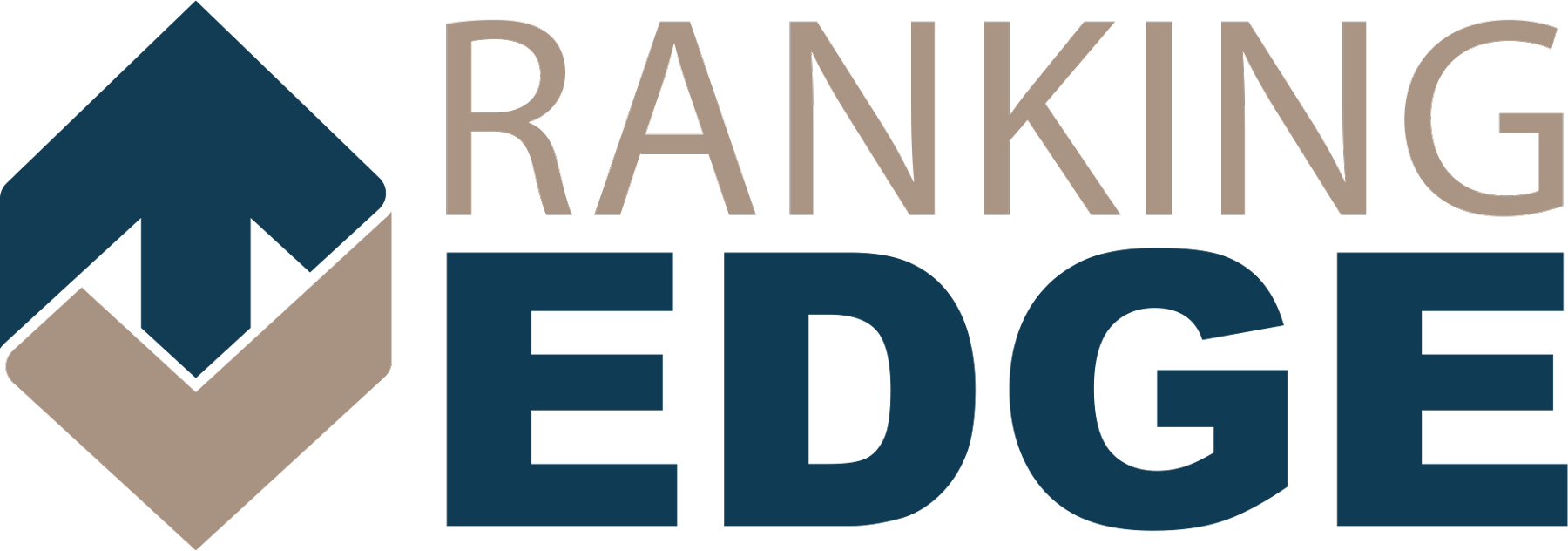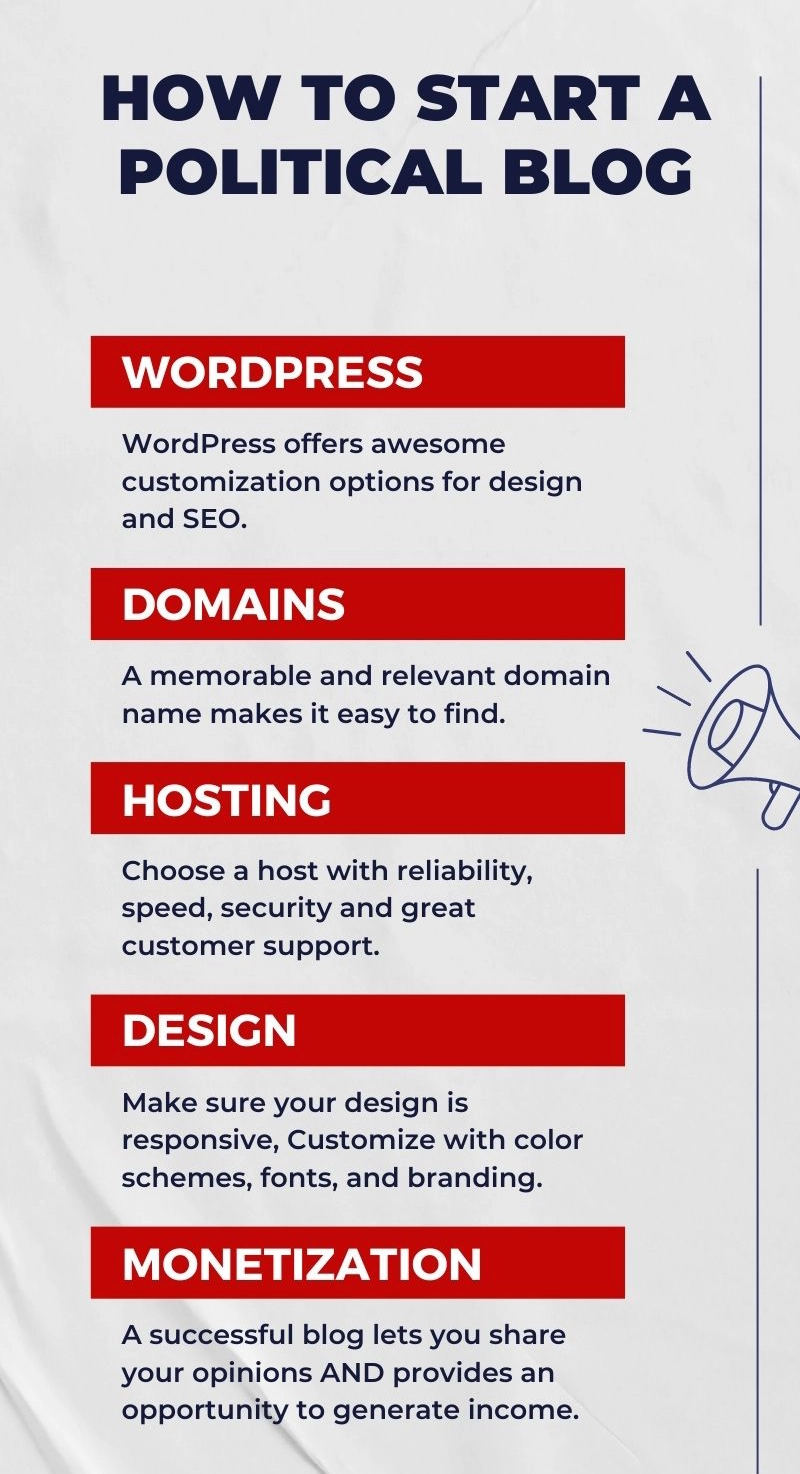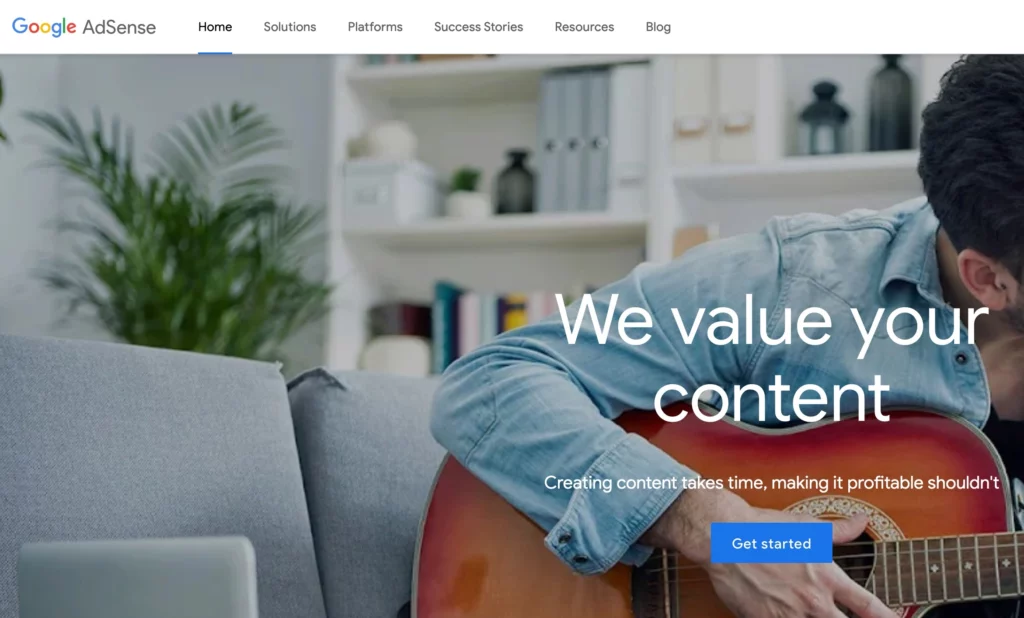If you’ve ever wondered how to start a political blog, you’re not alone.
In the diverse world of the internet, political blogging has become a popular way for people to express their opinions, dissect news stories, and advocate for their favorite causes.
These digital platforms provide writers with the opportunity to discuss and analyze the ever-evolving world of politics, drawing on unique perspectives and insights from bloggers of all backgrounds.
Importance of Political Blogs in Today’s Digital Landscape
As you dive into the process of how to start a political blog, it’s important to recognize the critical role these platforms play in shaping public opinion and driving conversations around crucial issues.
Political blogs not only empower individuals to share their views but also serve as an alternative to traditional media outlets, offering a diverse range of voices and ideas.
By fostering open dialogue and encouraging healthy debate, political blogs help create a more informed and engaged citizenry.
So whether you’re an aspiring political commentator or simply someone who wants to stay updated on current events, understanding how to start a political blog is a key step in contributing to the vibrant digital landscape we all inhabit.
Definition of Political Blogs
In simple terms, political blogs are websites or online platforms that primarily focus on discussing, analyzing, and sharing opinions about politics, government, and public policy.
These blogs can be run by individuals, groups, or even media organizations, and they can cover topics ranging from local issues to international affairs.
Types of Political Blogs
There are various types of political blogs, each with its unique approach and focus. Here are three main categories you’ll encounter:
- Personal opinion blogs
- These blogs are often run by individuals who share their thoughts and perspectives on political events, issues, and candidates.
- They may be written in a conversational tone and reflect the blogger’s personal beliefs and values.
- Examples: A progressive commentator’s blog or a conservative pundit’s personal site.
- News and analysis blogs
- These blogs provide detailed analysis, commentary, and context on political news and events.
- They often feature a team of writers, researchers, or journalists who contribute to the content.
- Examples: A blog analyzing polling data, a site dedicated to fact-checking political claims, or a platform that offers in-depth policy analysis.
- Advocacy and activism blogs
- These blogs focus on promoting specific political causes, policies, or candidates.
- They often aim to mobilize readers to take action, such as signing petitions, attending rallies, or contacting elected officials.
- Examples: A blog supporting environmental policy reform, a site advocating for voting rights, or a platform endorsing a particular political candidate.
Role of Political Blogs in Shaping Public Opinion and Discourse
Political blogs play a significant role in shaping public opinion and discourse. Here are a few ways they contribute to the political landscape:
- Offering diverse perspectives: Political blogs provide a variety of viewpoints, often presenting opinions that may not be well-represented in mainstream media.
- Encouraging engagement: By inviting readers to comment, share, and discuss their content, political blogs foster active participation in political discussions.
- Influencing decision-makers: Bloggers can sometimes have a direct impact on policy decisions, as their articles and opinions may be read and considered by politicians, policy-makers, and other influential figures.
- Informing the public: By analyzing complex issues and breaking down political jargon, political blogs help make politics more accessible and understandable to a wider audience.
- Holding politicians accountable: Political bloggers often scrutinize and question the actions of political leaders, helping to hold them accountable for their decisions and policies.
How to Start a Political Blog
Identifying your Niche and Target Audience
One of the first steps in starting a political blog is identifying your niche and target audience. A clear focus will help you create relevant, engaging content that appeals to a specific group of readers. Consider the following when choosing your niche:
- Political ideology: Are you conservative, liberal, or somewhere in between? Your political stance will significantly influence the topics you cover and the perspective you present.
- Geographic focus: Will you focus on local, national, or international politics? Your choice will determine the issues and news you’ll discuss on your blog.
- Special interests: Are you passionate about specific issues, such as environmental policy, civil rights, or economic reform? Focusing on particular topics can help set your blog apart and attract a dedicated audience.
Once you’ve identified your niche, think about your target audience. Who are they? What do they care about? Understanding your readers will help you create content that resonates with them and keeps them coming back for more.
How to Start a Political Blog and Choosing a Blogging Platform
Selecting the right blogging platform is crucial to the success of your political blog. Here are four popular options, each with its unique features and benefits:
WordPress
WordPress is a highly customizable and versatile platform, offering both a free, hosted version (WordPress.com) and a self-hosted version (WordPress.org).
With thousands of themes and plugins available, you can easily create a professional-looking blog tailored to your needs.
It is ideal for bloggers who want full control over their website and the ability to scale and add features as their blog grows.
Blogger
Blogger is a free, user-friendly platform owned by Google.
It offers a simple interface for creating and managing blog posts, making it a great option for beginners.
While customization options are limited compared to WordPress, Blogger provides all the essential features needed for a basic political blog.
Medium
Medium is a blogging platform and online community that focuses on high-quality content and user engagement.
It’s easy to use and requires no setup or technical knowledge, making it an excellent choice for those who want to focus solely on writing.
However, customization and monetization options are limited, and you won’t have your domain name.
Ghost
Ghost is a minimalist, open-source blogging platform designed for simplicity and speed.
It offers a clean, user-friendly interface for creating and managing content, as well as built-in SEO features.
Ghost is ideal for bloggers who want a fast, streamlined platform with a focus on writing and readability. But it may not be as versatile as WordPress for those seeking extensive customization options.
Why WordPress is the Best Platform for Political Blogging
WordPress stands out as the best platform for political blogging for several reasons, ranging from customization options to the availability of resources and its large user base.
Here are some of the main reasons why WordPress is the top choice for political bloggers:
How to Start a Political Blog with Flexibility and Customization
WordPress offers virtually unlimited customization options, thanks to thousands of themes and plugins available. This means you can easily create a unique, professional-looking blog that represents your political views and aligns with your brand.
With countless design choices and the ability to modify the functionality of your blog, WordPress enables you to create a tailored experience for your readers.
User-friendly Interface
While WordPress provides advanced customization options, it also maintains a user-friendly interface that is accessible to beginners. The platform makes it simple to create, edit, and manage blog posts. Even for those with no prior experience in web design or coding.
Additionally, the WordPress community provides extensive documentation and tutorials, making it easy to learn and grow as a blogger.
Strong SEO Capabilities
Search engine optimization (SEO) is crucial for increasing your blog’s visibility and attracting a larger audience.
WordPress is designed with SEO in mind, offering built-in features and plugins. For example, Yoast SEO plugin helps optimize your content and site structure for search engines.
This gives your political blog a better chance of ranking higher in search results and reaching more readers.
Scalability
As your political blog grows, you’ll want a platform that can grow with you. WordPress is highly scalable, allowing you to add new features, pages, and integrations as your needs evolve.
Whether you want to add an online store, a forum, or a membership section, WordPress can handle it all, making it an ideal choice for long-term growth.
Large Community and Support
WordPress powers over 40% of all websites on the internet. It has a massive community of users, developers, and designers.
This extensive network provides a wealth of knowledge, resources, and support for political bloggers. From forums and tutorials to dedicated support teams, you’ll never be without assistance when you need it.
How to Start a Political Blog with Monetization Options
Political bloggers who want to monetize their content will find WordPress to be an excellent choice. The platform supports various monetization methods, including display advertising, sponsored content, affiliate marketing, and selling digital products.
With numerous plugins and integrations available, WordPress makes it easy to generate income from your political blog.
In summary, WordPress is the best platform for political blogging due to its flexibility, user-friendly interface, robust SEO capabilities, scalability, extensive community support, and monetization options.
These features make WordPress an ideal choice for political bloggers looking to create a unique, engaging, and successful online presence.
Registering a Domain Name and Selecting a Hosting Provider
Choosing the right domain name and hosting provider are essential steps in starting your political blog. A memorable domain name will help establish your blog’s identity. A reliable hosting provider will ensure your site runs smoothly and securely.
Registering and Choosing a Domain Name
Your domain name is the web address that users will type into their browsers to access your blog. When selecting a domain name, consider the following tips:
- Keep it short and memorable: Choose a domain name that is concise and easy to remember. This will make it more likely for users to return to your site.
- Use relevant keywords: Including keywords related to your niche, such as “politics” or “policy,” can help improve your blog’s search engine rankings and make it clear what your blog is about.
- Choose the right domain extension: The most common domain extension is “.com,” but you may also consider other options like “.org” or “.net.” You can also use country-specific extensions like “.co.uk” or “.us” if your blog focuses on regional politics.
To register your domain name, you’ll need to use a domain registrar like GoDaddy, Namecheap, or Google Domains. These services typically charge an annual fee to maintain your domain registration.
Selecting a hosting provider:
A hosting provider is a company that stores your blog’s files and serves them to users when they visit your site. When choosing a hosting provider, consider the following factors:
- Reliability and uptime: Look for a provider that guarantees at least 99.9% uptime to ensure your site is accessible to users around the clock.
- Speed and performance: Fast loading times are crucial for user experience and search engine rankings. Choose a hosting provider known for its speed and performance.
- Customer support: Opt for a provider with a solid reputation for customer support, as this will be invaluable if you encounter any issues with your blog.
- Scalability: Select a hosting provider that offers plans to accommodate your blog’s growth, such as upgrading to a higher-tier plan or adding more resources as needed.
- Security features: Ensure your chosen provider offers robust security features, such as SSL certificates, malware scanning, and daily backups, to protect your blog and user data.
Some popular hosting providers for WordPress include Bluehost, SiteGround, and WP Engine. Compare their plans, features, and pricing to find the best fit for your political blog.
Once you’ve registered your domain and selected a hosting provider, you’ll be ready to set up your WordPress site and start building your political blog.
Using WPEngine as a Managed Hosting Provider
When starting a political blog, choosing a reliable and high-performance hosting provider is crucial. WPEngine is an excellent option for those looking for a managed WordPress hosting solution.
We use WPEngine for our blog’s hosting, and we’ve had a great experience with their services.
Here’s why we recommend WPEngine for your political blog:
Managed WordPress Hosting: As a managed hosting provider, WPEngine takes care of all the technical aspects of running a WordPress site, such as updates, security, and performance optimization.
This allows you to focus on creating content and growing your blog without worrying about the technical details.
Based in Austin, Texas: WPEngine’s headquarters are located in Austin, Texas, which means they understand the needs of U.S. based customers and are knowledgeable about the local market.
This can be a significant advantage when it comes to addressing specific concerns related to your political blog.
Excellent Customer Service: WPEngine offers exceptional customer service with phone help available for customers who prefer speaking to a representative. Their support team is composed of English speakers, ensuring clear communication and understanding when addressing any issues or concerns.
Additionally, their chat support is both fast and efficient, providing quick assistance when needed.
Performance and Speed: WPEngine is known for its outstanding performance, offering fast loading times and smooth user experience. This is particularly important for political blogs, as readers expect quick access to the latest news and opinions.
WPEngine’s infrastructure is optimized for WordPress, ensuring optimal performance for your blog.
Security Features: WPEngine takes security seriously, offering features such as daily backups, malware scanning, and free SSL certificates. This ensures that your political blog remains secure and your users’ data is protected.
Scalability: As your political blog grows, WPEngine’s hosting plans can easily accommodate your expanding needs. Their hosting packages are designed to support sites of various sizes and traffic levels, making it simple to upgrade your plan as your blog gains popularity.
How to Start a Political Blog Design
Once you have your domain, hosting, and WordPress installed, it’s time to design your political blog. A well-designed blog is visually appealing, user-friendly, and showcases your content effectively.
Here are some steps to follow when designing your political blog:
Choosing a Theme or Template
WordPress offers a vast library of themes and templates, both free and premium, that cater to various niches, including political blogs. When selecting a theme, consider the following factors:
- Responsiveness: Ensure the theme is responsive, meaning it automatically adjusts to different screen sizes and devices, providing an optimal browsing experience for all users.
- Customization options: Choose a theme that offers a variety of customization options, such as color schemes, fonts, and layout choices, to create a unique and visually appealing blog.
- Ease of use: Opt for a theme with a user-friendly interface, making it simple to modify and update your blog’s design without requiring coding knowledge.
Some popular theme providers include Elegant Themes, ThemeForest, and StudioPress. Browse their collections to find a theme that suits your political blog’s style and requirements.
Customizing your Blog’s Appearance
Once you have selected a theme, you can start customizing your blog’s appearance to match your brand and vision. Consider the following elements when customizing your blog:
- Color scheme: Choose a color palette that reflects your blog’s personality and political stance. Use contrasting colors for text and backgrounds to ensure readability.
- Typography: Select fonts that are easy to read and complement your blog’s design. Use headings and subheadings to break up large blocks of text and make your content more accessible.
- Navigation: Design a clear and intuitive navigation menu that makes it easy for users to explore your blog’s content. Include categories, tags, and a search function to help readers find specific topics or articles.
- Logo and branding: Incorporate a unique logo and consistent branding elements throughout your blog to create a cohesive and professional look.
Essential Features and Plugins
WordPress offers a plethora of plugins that can enhance your political blog’s functionality and user experience. Here are some essential features and plugins to consider for your blog:
- Social sharing: Encourage readers to share your content on social media platforms with plugins like Social Warfare or AddThis.
- Comments and discussions: Facilitate conversations and engagement by using a robust commenting system like Disqus or the native WordPress comments feature.
- SEO optimization: Improve your blog’s search engine rankings with an SEO plugin like Yoast SEO or Rank Math.
- Contact forms: Allow readers to get in touch with you easily by adding a contact form to your blog using plugins like Contact Form 7 or WPForms.
- Analytics: Track your blog’s traffic and performance with analytics plugins like Google Analytics or MonsterInsights.
- Security: Keep your blog safe and secure with security plugins like Wordfence or Sucuri.
By carefully selecting a theme, customizing your blog’s appearance, and incorporating essential features and plugins, you can create a visually appealing, user-friendly, and engaging political blog that stands out from the crowd.
Why Magazine-Type Themes Are Good for Political Blogs
Magazine-type themes are an excellent choice for political blogs due to their unique design elements and features specifically tailored for content-heavy websites.
These themes offer a visually appealing and organized layout, making them an ideal fit for political bloggers who want to present their content professionally and effectively.
Here are some reasons why magazine-type themes are suitable for political blogs:
Content organization:
Magazine-type themes are designed to display a large volume of content in an organized and user-friendly manner. They often include multiple categories, sections, and featured areas, making it easy for readers to find and explore various topics on your blog.
This is particularly important for political blogs, as they typically cover a wide range of subjects and news stories.
Visual hierarchy:
These themes create a clear visual hierarchy by using different font sizes, colors, and styles for headlines, subheadings, and body text.
This helps guide readers through your content, highlighting the most important information and making your blog more accessible and engaging.
Dynamic homepage:
Magazine-type themes often feature dynamic homepages that showcase your latest and most popular content. This keeps your blog looking fresh and up-to-date, while also highlighting your most compelling articles to engage new and returning visitors.
Multimedia support:
Political blogs often include various types of media, such as images, videos, and infographics. Magazine-type themes are designed to support and showcase multimedia content seamlessly, providing a visually appealing and immersive experience for your readers.
Responsive design:
Like any good WordPress theme, magazine-type themes are responsive, ensuring your content looks great on any device or screen size. This is crucial for political blogs, as readers may access your site on their smartphones, tablets, or desktop computers.
Customization options:
Magazine-type themes typically offer a wide range of customization options, allowing you to create a unique and tailored experience for your readers. You can easily modify colors, fonts, layouts, and other design elements to align with your political blog’s branding and style.
Social sharing integration:
Given the nature of political content, it’s essential to make it easy for readers to share your articles on social media platforms.
Magazine-type themes often include built-in social sharing buttons and features that encourage readers to share and discuss your content, increasing your blog’s visibility and reach.
In summary, magazine-type themes are an excellent choice for political blogs due to their content organization, visual hierarchy, dynamic homepages, multimedia support, responsive design, customization options, and social sharing integration.
These features make it easy for political bloggers to present their content professionally, engage readers, and create a successful online presence.
How to Start a Political Blog with Engaging Content
Once you’ve set up and designed your political blog, the next crucial step is to create engaging and compelling content that will resonate with your target audience. Here are some tips to help you create content that attracts and retains readers:
Developing a Content Strategy
A well-planned content strategy is essential for ensuring your political blog remains focused and relevant. Consider the following when developing your strategy:
- Identify your niche and target audience: Understand the specific topics and issues that interest your audience and focus on creating content that addresses their concerns and interests.
- Create a content calendar: Plan your content in advance to ensure consistent posting and to help you stay organized. A content calendar also allows you to schedule posts around important political events or news stories.
- Diversify your content: Offer a mix of content types, such as opinion pieces, news analysis, interviews, and long-form articles, to keep your readers engaged and cater to different preferences.
- Encourage interaction: Create opportunities for readers to engage with your content by asking open-ended questions, inviting comments, or incorporating polls and surveys.
Using Multimedia Elements
Incorporating multimedia elements in your content can help make your political blog more engaging and visually appealing. Consider the following:
- Images: Use high-quality and relevant images to support your content, break up large blocks of text, and create a visually engaging experience for your readers.
- Videos: Include videos, such as interviews, news clips, or commentary, to provide additional context and depth to your content.
- Infographics: Use infographics to present complex data or statistics in a visually appealing and easily digestible format.
- Audio: Consider incorporating podcasts or audio recordings of interviews and discussions to cater to readers who prefer listening to content.
How to Start a Political Blog and Ensure Accuracy and Credibility
As a political blogger, maintaining accuracy and credibility is crucial for building trust with your audience. Keep the following in mind when creating content:
- Fact-check: Verify the accuracy of any facts, statistics, or claims you include in your content. Use reliable sources and link to them whenever possible.
- Attribute sources: Properly attribute any quotes, images, or other content you use from external sources to avoid plagiarism and demonstrate transparency.
- Avoid bias: Strive to present information objectively and fairly, even if you have a particular political stance. This will help build your credibility as a reliable source of information.
- Proofread and edit: Carefully proofread and edit your content before publishing to ensure it is free of errors, inconsistencies, or inaccuracies.
By developing a solid content strategy, incorporating multimedia elements, and ensuring accuracy and credibility in your content, you can create a political blog that engages your audience, sparks conversations, and establishes your authority in the political sphere.
How to Start a Political Blog, Build an Online Presence, and Grow your Audience
Creating engaging content is only half the battle; you also need to actively promote your political blog and grow your audience. Here are some strategies for building an online presence and expanding your reach:
Promoting your Blog on Social Media
Social media platforms are invaluable tools for promoting your political blog and connecting with your target audience. Consider the following when promoting your blog on social media:
- Share your content: Regularly share your blog posts on relevant social media platforms, such as Facebook, Twitter, LinkedIn, and Instagram, to increase their visibility and reach.
- Use hashtags: Include relevant hashtags in your social media posts to help users discover your content and join ongoing conversations about specific topics.
- Engage with your followers: Respond to comments, questions, and messages from your followers to build relationships and foster a sense of community.
- Participate in online discussions: Join and contribute to online discussions, groups, or forums related to your blog’s niche to establish your expertise and attract new readers.
Networking with Other Political Bloggers and Influencers
Building relationships with other political bloggers and influencers can help increase your blog’s visibility and credibility. Here are some tips for successful networking:
- Comment on other blogs: Leave thoughtful and insightful comments on other political blogs to demonstrate your knowledge and interest in the subject matter.
- Attend events and conferences: Participate in political events, conferences, or webinars to meet like-minded individuals and expand your professional network.
- Collaborate: Reach out to other political bloggers or influencers to propose collaborations, such as guest posts, interviews, or joint projects.
Engaging with your Readers through Comments and Discussions
Encouraging interaction on your blog can help build a loyal and engaged audience. Consider the following:
- Respond to comments: Take the time to reply to comments on your blog, addressing questions, concerns, or feedback from your readers.
- Foster a positive community: Encourage respectful and constructive discussions in your blog’s comment section by setting clear guidelines and moderating comments as needed.
- Solicit feedback: Ask your readers for their opinions on specific topics, issues, or content types to help you improve and tailor your blog to their preferences.
How to Start a Political Blog with Guest Posting and Collaboration
Guest posting on other blogs or collaborating with other political bloggers can help you gain exposure and attract new readers to your blog. Consider the following:
- Identify relevant blogs: Research and identify blogs in your niche that accept guest posts or are open to collaborations.
- Create high-quality content: Write well-researched, engaging, and original content that will resonate with the host blog’s audience.
- Include a bio and link: Ensure your guest post includes a short bio and a link back to your political blog, allowing readers to easily find and explore your content.
By actively promoting your blog on social media, networking with other political bloggers and influencers, engaging with your readers, and participating in guest posting and collaborations, you can build a strong online presence and grow your audience, ultimately increasing your blog’s reach and impact in the political sphere.
How to Start a Political Blog and Make Money!
A successful political blog not only allows you to share your opinions and insights but also provides an opportunity to generate income.
In this section, we’ll explore whether political bloggers make money and the various ways to monetize your political blog.
Do Political Bloggers Make Money?
Yes, political bloggers can make money through a variety of monetization strategies.
The amount of money a political blogger earns depends on factors such as their blog’s niche, audience size, content quality, and the effectiveness of their monetization methods.
Some political bloggers make a modest income, while others generate a full-time living from their blogs.
Ways to Make Money from a Political Blog
There are several ways to monetize a political blog, ranging from advertising to selling digital products. Here are some popular methods to consider:
Display advertising:
Display advertising is one of the most common ways to generate income from a political blog. You can use platforms like Google AdSense or sell direct ads to advertisers.
These ads are typically displayed as banners or sidebar widgets on your blog, and you earn revenue based on impressions or clicks.
Sponsored content and partnerships:
Sponsored content involves partnering with brands, organizations, or political campaigns to create content that promotes their products, services, or message. This can include sponsored blog posts, social media posts, or even hosting sponsored events.
Be sure to disclose any sponsored content to maintain transparency and trust with your readers.
Affiliate marketing:
Affiliate marketing involves promoting products or services on your blog in exchange for a commission on any sales or leads generated through your affiliate links.
You can join affiliate programs related to your political niche, such as political books, courses, or merchandise.
Selling digital products:
Creating and selling digital products, such as ebooks, courses, or webinars, can be a lucrative way to monetize your political blog. These products should provide value and address the needs or interests of your audience.
For example, you could create an ebook about political activism strategies or an online course on political communication.
Donations and crowdfunding:
If your readers are passionate about your content and the causes you support, you can ask for donations or launch crowdfunding campaigns to help support your blog.
Platforms like Patreon, Ko-fi, or GoFundMe can facilitate this process and allow your readers to contribute financially to your blog’s success.
Freelance writing and consulting opportunities:
As an established political blogger, you can leverage your expertise and online presence to secure freelance writing or consulting opportunities.
This can include writing articles for other publications, providing political analysis for media outlets, or offering consulting services to political campaigns or organizations.
By exploring and implementing these monetization strategies, you can turn your passion for politics and blogging into a profitable venture, allowing you to continue sharing your insights and opinions while generating income from your political blog.
How to Start a Political Blog and Deal with Challenges and Ethics
Political blogging, while rewarding, can come with its unique set of challenges and ethical considerations. In this section, we’ll discuss some of the common issues political bloggers face and how to navigate them.
Maintaining Objectivity and Avoiding Bias
As a political blogger, it’s essential to remain objective and avoid bias in your writing. While it’s natural to have personal opinions and viewpoints, presenting information fairly and accurately is crucial for establishing credibility and trust with your audience.
To maintain objectivity:
- Acknowledge your biases: Recognize your own biases and be transparent about your political stance with your readers.
- Present multiple perspectives: Ensure you’re presenting multiple viewpoints on a particular topic or issue, even if you disagree with some of them.
- Fact-check: Always verify the accuracy of your information and avoid making unsubstantiated claims.
Dealing with Negative Comments and Trolls
Negative comments and trolls are an unfortunate reality of online discourse, particularly in the realm of politics. To deal with this challenge:
- Set comment guidelines: Establish clear guidelines for acceptable behavior in your blog’s comment section and enforce them consistently.
- Moderate comments: Regularly monitor and moderate comments to remove any offensive or inappropriate content.
- Engage respectfully: Respond to constructive criticism with an open mind and engage in respectful discussions, even with those who disagree with you.
- Ignore trolls: Don’t engage with trolls or users who are deliberately trying to provoke a reaction. Focus on fostering a positive and constructive community on your blog.
How to Start a Political Blog and Navigate Legal and Ethical Issues
Political bloggers must also be aware of legal and ethical issues that may arise. Here are some key concerns to consider:
Copyright and plagiarism:
Ensure that you’re not infringing on others’ copyrighted material or plagiarizing their work. Always attribute quotes, images, or other content you use from external sources, and obtain permission when necessary.
Defamation and libel:
Avoid making false or defamatory statements about individuals, organizations, or political parties that could result in legal action. Always base your content on verifiable facts and avoid making unsubstantiated accusations.
Privacy concerns:
Respect the privacy of others and avoid sharing personal information without their consent. Be particularly cautious when discussing sensitive topics or sharing information about private individuals.
By addressing these challenges and ethical considerations, you can create a successful and responsible political blog that fosters open and respectful discourse while maintaining credibility and trust with your audience.
Final Thoughts and Conclusion of How to Start a Political Blog
Starting a political blog is an exciting and rewarding endeavor that allows you to share your insights, opinions, and passion for politics with a wider audience.
By following the steps outlined in this article and remaining dedicated to producing quality content and engaging with your readers, you can create a successful and influential political blog.
As an aspiring political blogger, it’s essential to remember that building a successful blog takes time, effort, and persistence. Don’t be discouraged by initial challenges or setbacks.
Instead, continue to learn, grow, and adapt as you develop your online presence and share your unique perspective on the political landscape.
So, don’t wait – pursue your passion for politics and start your political blog today.
With determination, hard work, and a genuine interest in engaging with your audience, you can make a lasting impact in the world of political discourse.









